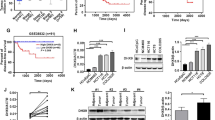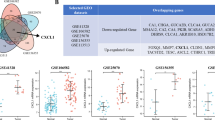Abstract
Colorectal cancer is one of the commonest of solid malignancy in the world. Activating transcription factor 3 (ATF3), a homolog of the mouse TI-241 and rat LFR-1, is a stress responsive gene that has been widely indicated in different malignancies. However, the role of ATF3 in colon cancer is paradoxical with both a suggested pro- and anti-tumorigenic role. The objective of the current study was to investigate the role of ATF3 in colon cancer metastasis using HT29 and CaCO2 colon cancer cell lines. Expression of ATF3 was initially evaluated in five pairs of colon cancer and matched noncancerous colon tissues. The role of ATF3 in promoting in vitro migration and invasion were evaluated by siRNA-mediated knockdown and adenovirus-mediated overexpression of ATF3. In addition, the role of ATF3 in promoting in vivo tumor growth and hepatic metastasis was investigated by shRNA-mediated knockdown of ATF3. Expression of ATF3 was more in the colon cancer tissues as compared with the pooled noncancerous control colon tissue. Our results showed that in both HT29 and CaCO2 cells, ATF3 promoted in vitro motility and invasion. Furthermore, knockdown of ATF3 attenuated subcutaneous tumor growth and CD31+ neovasculature in xenograft assays with HT29 and CaCO2 cells and inhibited hepatic metastasis. Cumulatively, our results unequivocally show that ATF3 promotes colon cancer metastasis.




Similar content being viewed by others
Abbreviations
- ATF3:
-
Activating transcription factor 3
- MOI:
-
Multiplicity of infection
- SEM:
-
Standard error of mean
- MSI:
-
Microsatellite instability
- CIMP:
-
CpG island methylator phenotype
References
Siegel R, Naishadham D, Jemal A. Cancer statistics, 2013. CA Cancer J Clin. 2013;63:11–30.
Fidler IJ. Critical factors in the biology of human cancer metastasis: 28th G. H. A. Clowes Memorial Award Lecture. Cancer Res. 1990;50:6130–8.
Chang GJ, Kaiser AM, Mills S, Rafferty JF, Buie WD. Practice parameters for the management of colon cancer. Dis Colon Rectum. 2012;55:831–43.
Hai T, Hartman MG. The molecular biology and nomenclature of the ATF/CREB family of transcription factors: ATF proteins and homeostasis. Gene. 2001;273:1–11.
Ishiguro T, Nakajima M, Naito M, Muto T, Tsuruo T. Identification of genes differentially expressed in B16 murine melanoma sublines with different metastatic potentials. Cancer Res. 1996;56:875–9.
Ameri K, Hammond EM, Culmsee C, Raida M, Katschinski DM, Wenger RH, et al. Induction of activating transcription factor 3 by anoxia is independent of p53 and the hypoxic HIF signaling pathway. Oncogene. 2007;26:284–9.
Hai T, Wolfgang CD, Marsee DK, Allen AE, Sivaprasad U. ATF3 and stress responses. Gene Expr. 1999;7:321–35.
Ishiguro T, Nagawa H, Naito M, Tsuruo T. Inhibitory effect of ATF3 antisense oligonucleotide on ectopic growth of HT29 human colon cancer cells. Jpn J Cancer Res. 2000;91:833–6.
Hackl C, Lang SA, Moser C, Mori A, Fichtner-Feigl S, Hellerbrand C, et al. Activating transcription factor-3 (ATF3) functions as a tumor suppressor in colon cancer and is upregulated upon heat-shock protein 90 (Hsp90) inhibition. BMC Cancer. 2010;10:668.
Lu D, Wolfgang CD, Hai T. Activating transcription factor 3, a stress inducible gene, suppresses Ras-stimulated tumorigenesis. J Biol Chem. 2006;281:10473–81.
Bandyopadhyay S, Wang Y, Zhan R, Pai SK, Watabe M, Iiizumi M, et al. The tumor metastasis suppressor gene Drg-1 down regulates the expression of ATF3 in prostate cancer. Cancer Res. 2006;66:11983–90.
Bottone Jr FG, Moon Y, Kim JS, Alston-Mills B, Ishibashi M, Eling TE. The anti-invasive activity of cyclooxygenase inhibitors is regulated by the transcription factor ATF3 (activating transcription factor 3). Mol Cancer Ther. 2005;4:693–703.
Ahmed D, Eide PW, Eilertsen IA, Danielsen SA, Eknæs M, Hektoen M, et al. Epigenetic and genetic features of 24 colon cancer cell lines. Oncogenesis. 2013;2:e71.
Stoeltzing O, Ahmad SA, Liu W, McCarty MF, Wey JS, Parikh AA, et al. Angiopoietin-1 inhibits vascular permeability, angiogenesis, and growth of hepatic colon cancer tumors. Cancer Res. 2003;63:3370–7.
Stoeltzing O, Liu W, Reinmuth N, Fan F, Parikh AA, Bucana CD, et al. Regulation of hypoxia-inducible factor-1alpha, vascular endothelial growth factor, and angiogenesis by an insulin-like growth factor-I receptor autocrine loop in human pancreatic cancer. Am J Pathol. 2003;163:1001–11.
Lang SA, Moser C, Gaumann A, Klein D, Glockzin G, Popp FC, et al. Targeting heat shock protein 90 in pancreatic cancer impairs insulin-like growth factor-I receptor signaling, disrupts an interleukin-6/signal-transducer and activator of transcription 3/hypoxia-inducible factor-1alpha autocrine loop, and reduces orthotopic tumor growth. Clin Cancer Res. 2007;13:6459–68.
Rooney PH, Murray GI, Stevenson DA, Haites NE, Cassidy J, McLeod HL. Comparative genomic hybridization and chromosomal instability in solid tumors. Br J Cancer. 1999;80:862–73.
Yin X, DeWille J, Hai T. A potential dichotomous role of ATF3, an adaptive-response gene, in cancer development. Oncogene. 2008;27:2118–27.
Moustakas A, Heldin CH. The regulation of TGF beta signal transduction. Development. 2009;136:3699–714.
Polyak K, Weinberg RA. Transitions between epithelial and mesenchymal states: acquisition of malignant and stem cell traits. Nat Rev Cancer. 2009;9:265–73.
Ailles LE, Weissman IL. Cancer stem cells in solid tumors. Curr Opin Biotechnol. 2007;18:460–6.
Conflict of interest
None.
Author information
Authors and Affiliations
Corresponding author
Additional information
Zhi-Yong Wu and Zheng-mao Wei contributed equally to this work.
Rights and permissions
About this article
Cite this article
Wu, ZY., Wei, Zm., Sun, SJ. et al. Activating transcription factor 3 promotes colon cancer metastasis. Tumor Biol. 35, 8329–8334 (2014). https://doi.org/10.1007/s13277-014-2044-4
Received:
Accepted:
Published:
Issue Date:
DOI: https://doi.org/10.1007/s13277-014-2044-4




